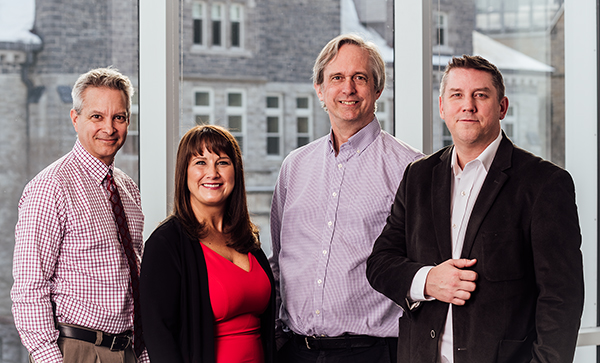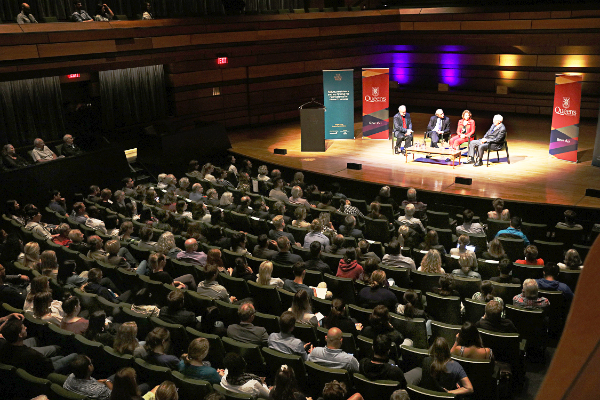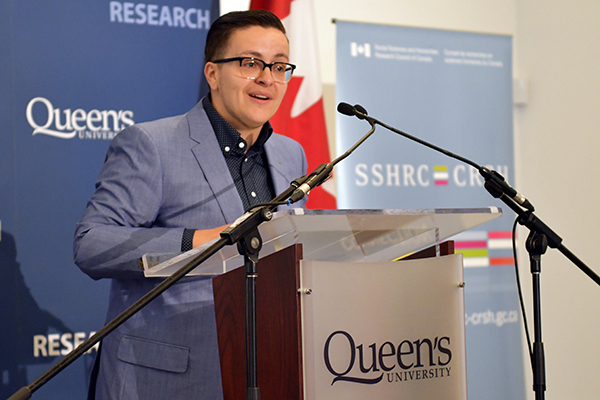Discoveries, collaborations, and award-winning scholarship
December 20, 2019
Share
Research prominence at the national and international level is a key driver for Queen’s and in 2019 Queen’s researchers continued to make headlines for their discoveries, collaborations, and award-winning scholarship.
As we near the end of the year, the Gazette highlights some of the research and people who captured our attention.
Research Leadership
Each year, Queen’s faculty and researchers receive national and international recognition for their work and dedication to pushing the boundaries of knowledge. The university continues to rank second in Canada for awards per faculty member (2020 Maclean’s University Rankings), and 2019 saw Queen’s researchers win some of Canada’s top awards and honours for research excellence.

This spring, Michael Cunningham, Pascale Champagne, Philip Jessop, and Warren Mabee garnered the competitive NSERC Brockhouse Canada Prize for Interdisciplinary Research in Science and Engineering for their work in enhancing the value and sustainability of our renewable resources through collaboration. September saw four researchers – Rosa Bruno-Jofré, Margaret Moore, Kim Nossal, and Grégoire Webber – elected as Fellows and Members (College) of the Royal Society of Canada, and three researchers, John Smol, Wendy Craig, and Heather Stuart honoured by the Governor General for their work on bullying, mental health, and the Arctic.
Researcher Will Kymlicka recently received the SSHRC Gold Medal. One of the highest honours for the social sciences in Canada, Kymlicka was recognized for his groundbreaking work on the link between democracy and diversity. Internally, five Queen’s researchers – Mark Daymond, Robert Ross, Nancy van Deusen, Tucker Carrington, and Margaret Moore – were honoured with the university’s highest form of recognition for research achievement, the 2019 Prizes for Excellence in Research.
Major Initiatives

In September, a sold-out crowd packed the Isabel Bader Centre for the Performing Arts for the rare opportunity to hear two Nobel Laureates discuss their roads to research success, together with Canada’s Chief Science Officer Mona Nemer, and award-winning journalist André Picard. The event featured laureates Martin Chalfie, 2008 Nobel Prize in Chemistry, and Queen’s own Arthur McDonald, 2015 Nobel Prize in Physics, as part of the first-ever Canadian tour of the Nobel Prize Inspiration Initiative, an international outreach program striving to connect Nobel Laureates with scientific and student communities at universities and research centres worldwide.
Throughout the year, Queen’s researchers continued lead dialogue and provide fact-based insights on their areas of expertise with contributions to The Conversation Canada, the international news platform. In 2019, 62 researchers penned 93 articles with almost 1.5 million reads on The Conversation Canada site and dozens of republications.
For 19 undergraduate students, summer 2019 was an opportunity to gain valuable experience in discovery-based learning and to develop their research skills through the annual Undergraduate Student Summer Research Fellowships (USSRF). The beauty and creativity of research shined once again with the fourth annual Art of Research photo contest.
Finally, late-2019 saw the launch of the university’s new central Research@Queen’s website. From in-depth features to the latest information on the university’s researchers, the site is a destination showcasing the impact of Queen’s research.
Notable Discoveries and Advances
New discoveries and research publications this year contributed to national dialogues, challenged the status quo, and opened new research vistas.

A first-of-its-kind, First Nations-specific report, co-authored by Michael Green (Family Medicine), showed the number of First Nations people in Ontario living with diabetes is at an all-time high at 14.1 per cent. Queen’s researcher Dylan Robinson (Languages, Literatures and Cultures) led the first successful effort to replace misappropriated songs from copyrighted opera, Louis Riel.
Vicki Friesen (Biology) and former postdoctoral fellow Debbie Leigh sounded the alarm over the increasing loss of the genetic variation that allows species to adapt to the rapid and drastic environmental changes being generated by human activity.
P. Andrew Evans (Chemistry) and collaborators discovered a way to use pollen to deliver light sensitive drugs that could combat the problem of antibiotic resistance.
An important social innovation initiative based on pedagogical research, the Cadezna app, developed by Rena Upitis (Education) and collaborators, was created to support music learning in studios, ensembles, and classrooms.
Funding Future Research

Queen’s continued to attract leading researchers and competitive funding and awards through a number of national and international programs. The university also had the honour of hosting three national funding announcements: the SSHRC Insight Development and Talent grant programs, the Vanier Canada Graduate Scholarships and the Banting Post-Doctoral Fellowships, and the Women Entrepreneurship Strategy (WES) Ecosystem Fund.
The Canadian Cancer Trials Group (CCTG), based at Queen’s, was awarded $25 million from the U.S. National Institutes of Health (NIH) and the National Cancer Institute (NCI). The only non-American partner to receive direct funding to conduct trials, the monies will allow CCTG to continue its work leading major cancer clinical trials in Canada and develop new large-scale trials under CCTG leadership.
In May, the Government of Canada announced that seven Queen’s projects received $1.72 million from the first round of the New Frontiers in Research Fund (NFRF), designed to support early-career researchers as they pursue the next great discovery in their fields
Queen’s University welcomed three new and eight renewed Canada Research Chairs as part of the Government of Canada’s June announcement of a diverse group of Canada Research Chairs.
For more information on research at Queen’s, visit the website.